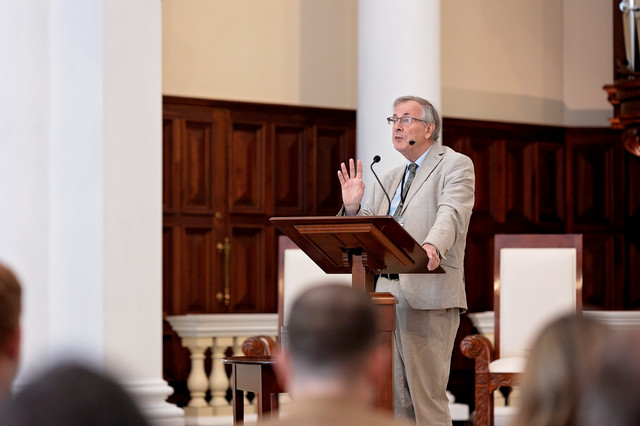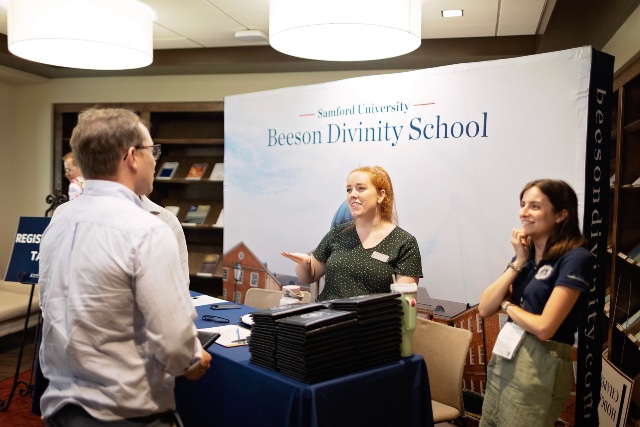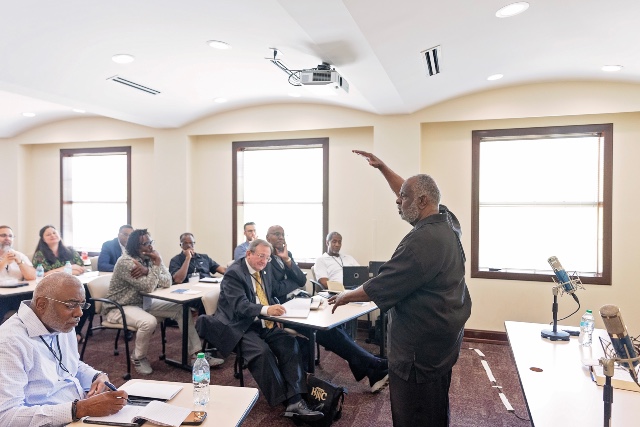
Led by renowned apologist Alister McGrath, and bolstered by an ensemble of Christian leaders, Samford University’s Beeson Divinity School hosted the second iteration of its annual preaching conference last week.
Revolving around the theme of “Persuasive Preaching: Story, Imagination and Apologetics,” the conference was organized by Beeson’s Robert Smith Jr. Preaching Institute’s Spirit and Power Project. It included three keynote lectures from McGrath, an author and theologian.
McGrath emphasized the role of preachers in showing how Christianity answers the universal questions people have regarding identity, value, purpose and agency.
This can be done, he said, by preaching the narrative of the Bible and showing a congregation how they can find their place within God’s story.
Quoting from Alasdair MacIntyre’s book After Virtue: A Study in Moral Theory, McGrath said people seeking direction in their lives—asking themselves “What I am to do?”—must first answer the question, “What story or stories am I a part of?”
Christianity offers people a chance to be part of something bigger than themselves, McGrath said. The world may offer competing stories, but the Christian story is true and connects with our deepest desires, he said.
“If the Christian story is true, it changes everything,” McGrath said.

McGrath’s second lecture emphasized the importance of the imagination in preaching.
“We need preachers who can expand people’s vision of God,” McGrath said. “A vision of God and a vision of our individual lives.”
Drawing from Isaiah 6, McGrath said it is vital that don’t shy away from being overwhelmed by a vision of God, the way Isaiah was when he saw God. Christians ought to be excited to have a clearer vision of God and see what He has called them to do in their individual lives.
McGrath encouraged preachers to use biblical images, such as ransom and reconciliation, that engage and connect with the questions of their congregants.
In his third lecture, McGrath reminded preachers to reassure their audience of the rationality of the Christian faith. “Evidence suggests many churchgoers want and need apologetics, too,” he said.
Preachers ought to reach their audience, rather than trying to be carbon copies of Christians such as the author C.S. Lewis and the pastor Tim Keller, who served in unique contexts.
Weaving apologetic themes into preaching can benefit congregants, McGrath said, whether done regularly or on special occasions. “We need deep beliefs about what is right, good and meaningful,” he said. “Christianity provides that.”

The conference featured sermons by Justin Bailey, professor of theology at Dordt University in Iowa, and Trevin Wax, vice president of research and resource development at the Southern Baptist Convention’s North American Mission Board. Beeson’s Doug Webster also delivered a sermon.
Breakout sessions were led by author and speaker Karen Swallow Prior, Beeson’s Distinguished Professor of Divinity Robert Smith Jr. (ret.), Bailey, and Maurice Watson, senior pastor of The Second Baptist Church in Little Rock, Arkansas.
